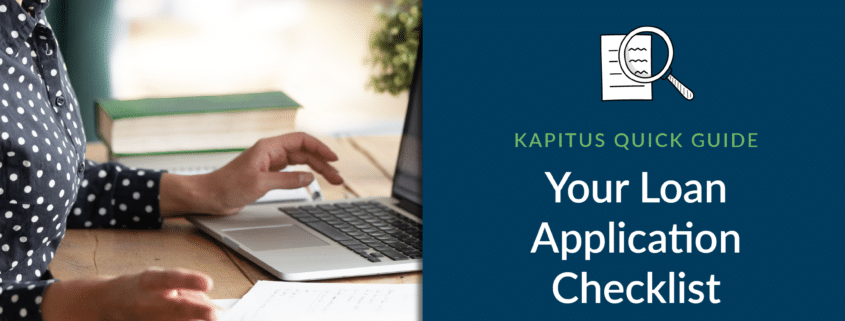Small Business Loan Application Checklist
Applying for a small business loan can be a tricky process, as there are several requirements you need to meet in order to obtain one. Those requirements can be confusing, as lenders require everything from business licenses and cash flow history to business plans and personal financial statements.
Whether you are applying for a business loan from a traditional bank, alternative lender, or credit union, as a small business owner in need of financing, one of the ways you can untangle the process is to use the following small business loan checklist. This checklist will help to ensure that you are ready to apply with confidence. Knowing what documents are needed for a business loan ahead of time will keep you organized and possibly help you get a reasonable interest rate on your loan.
Things to Consider Before Applying for a Business Loan
Before even beginning to collect your business loan paperwork, there are key factors you should consider:
Why do I need a loan?
This is perhaps the most important question you should ask yourself before applying for a small business loan. Getting a business loan just to have the money you borrowed sit around while you pay interest on it is obviously a bad idea.
- Ideally, the proceeds of a business loan should be used towards growing your business so that it can increase its revenue. For example, if you need money to develop and market a new product; purchase or upgrade equipment; expand your business by hiring new employees; or adding to your inventory would all be ideal reasons to obtain a loan.
- There are also financing products, such as working capital loans and business lines of credit, that can help your business operate during the offseason or when there’s a downturn in the economy.
Can I afford a loan?
Everyone knows that loans carry interest rates, and those rates are, in part, affected by the current interest rate environment. The Federal Reserve has raised interest rates 10 times in the past year-and-a-half, and that’s going to make the interest rate on virtually every type of business loan you want to take out more expensive. If you can afford to wait, you might want to hold off on getting a business loan until rates drop again.
What type of lender suits me best?
There are several types of lenders who can provide you with a small business loan. Those include traditional banks, alternative lenders, trade unions, marketplaces, and brokers. Each one comes with pros and cons that you should consider carefully. Some lenders, such as traditional banks and alternative lenders, offer financing products directly, while brokers typically offer you a marketplace of lenders. Also, some will demand higher business and personal credit scores than others, and some can deliver your funds more quickly than others. Carefully consider which one best serves your needs.
Can I get a grant instead?
There are, of course, several public and private business grants available to small businesses – some of which are backed by the US SBA. These grants often have specific criteria for applying. For example, some may be offered to small businesses in certain industries, and others may be offered only to women- and minority-owned businesses. Determine whether you qualify, but remember, applying for these can be a roll of the dice and you’re not guaranteed to win a grant.
Do I have a plan B?
All small business owners have the best of intentions when applying for a business loan, but life happens, and sometimes it won’t go your way. Before you take out a loan, it’s a good idea to make a contingency plan if things go south and you find yourself struggling to keep up with debt payments. Bankruptcy should be a last resort. Do you have assets you can sell? Do you have a cash reserve that you can draw upon until you get back on your feet?
Small Business Loan Documents Checklist
Go over this business loan documents list to make sure you are prepared for the sometimes overwhelming process of applying for a business loan. Doing so will simplify and hasten the process of getting the funding you need for your small business.
Check your credit scores
All lenders will pull both your personal and business credit reports. You can check your personal FICO scores online for free at the websites of the three main credit bureaus, Transunion, Experian and Equifax. You may have to pay a fee to get detailed reports so that you can check for errors. You can check your business credit score at the website of Dun & Bradstreet, the business credit bureau that is most heavily favored by lenders, for a small fee.
If your personal FICO and business credit scores are less-than-stellar, you may want to consider taking 6-9 months to improve them so that you can increase your chances of being approved and get a better rate on your loan.
Prove that your business exists
All lenders will require documentation proving that your small business is registered as a tax entity. At the very least they will require your employee identification number, which is issued by the IRS, and proof that your business is registered as a LLC, “Doing Business As” (DBA) company, or an S or C corporation. Lenders will also require proof of identity, pay stubs, and your social security number as well. For an SBA 7a loan or a term loan from a traditional bank, the lists of documents required can be even longer and include items such as business licenses, business lease agreements, proof of equity injection and franchise, and licensing agreements if you plan to franchise your business.
Have a business plan
If you plan to apply for a term loan with a traditional bank or for a SBA 7a loan, chances are you will need to show your business plan. This is a plan that shows how your business is organized and typically includes a market analysis and what niche your products and services fill, how they differ from your competitors, and why you believe your small business will be successful going forward. In short, it details why you believe your business is going to make money.
Financial Statements
Almost all types of lenders will want to see your business’s financial documents that indicate it has a strong cash flow history, including, but not limited to 3-6 months’ worth of business bank statements, 2-3 years of tax returns, balance sheet statements and income statements.
Run a cash flow analysis
Cash flow is one of the primary indicators that lenders use to understand the health of your business. Being able to show 3 to 6 months of positive cash flow can increase your chances of approval. It can even get you better financing terms for your small business loan.
Collect your business bank statements
Your business accounts are another good indicator of your company’s financial health. Generally, lenders want to see a positive daily balance on your bank statements for the past 3 to 6 months.
Gather supporting documents for unusually large deposits
Unusually large deposits can act as a red flag for lenders. While the presence of these deposits can delay finalization of loans, they are not necessarily bad. Many businesses understandably have large swings in deposits and credits to their account. If your business is like that, you can expedite your loan application process gathering copies of your account receivables and future contracts to support these large deposits.
Take care of delinquencies
Many lenders only want to lend to people whom they believe are of high character. This is especially true when you’re applying for SBA loans. As such, if you have any tax liens or are late on child support payments, you should take the necessary steps to clear those up before you apply.
Resolve any open tax liens
Unresolved open tax liens can hurt your ability to obtain financing. If possible, try to get a payment plan set up on any open tax liens you may have before you apply for a loan. A payment plan on a tax lien, along with a very strong positive cash flow will typically be considered by alternative lenders and even some SBA lenders for loan approval
Assess any collateral you may have
Before you apply for a loan package, you may want to sit down with a business loan specialist or an accountant to see if you need to put up collateral. This includes real estate, investment holdings, savings and even your car or valuable pieces of equipment you may own. Traditional banks often want collateral if your business credit or personal FICO score is shaky. In rare cases, alternative lenders may ask for collateral. Even if you have good credit, it might be worth applying for a secured bank loan or business line of credit because you may be able to notch a lower interest rate and a higher credit line or loan amount if you put up collateral.
Get trade references
If your business credit score is borderline, you can boost it by getting positive references from either your suppliers or, if you lease a physical space, your landlord. You can give these references to your credit bureaus and, if you’re using a traditional bank, to the loan officer. Having these could mean the difference between obtaining a loan or getting rejected.
If you get Rejected
Getting rejected for a business loan isn’t pleasant, but it can be a valuable lesson on how to get accepted the next time you apply. Traditional banks and alternative lenders want to grant you a loan approval because it’s the way they make money. As such, they will be happy to give you a detailed explanation for why you were denied, and, usually, it will take a bit of time to improve your business to the point where you can obtain that business loan.
While every rejection is different, some of the most common reasons for getting rejected for a business loan are:
Your business credit score is not high enough
Some of the ways you can raise your business credit score include:
- reducing the number of creditors you owe money to
- making sure you make debt payments on time for at least 6-9 months
- having a strong credit mix.
Other steps include being in good standing with your suppliers and increasing the assets of your business.
Insufficient time in business
Traditional banks typically won’t lend to a small business that hasn’t existed for at least three years, while alternative lenders may want to see at least two years in business. If this is the case, hold off on borrowing until your small business has been in operation for a sufficient time. If you can’t wait, see if you qualify for an SBA CDC/504 or SBA microloan, both of which only require 6 months in business.
Too much existing debt
This is actually a common reason why small businesses get turned down for a loan. If you already have outstanding loans, you can always try to retire them with a new loan. Additionally, if you have a line of credit that is close to being fully drawn, you should take steps to pay it down before applying for a new loan.
Your cash flow is not strong enough
If your small business’s cash flow is tight (meaning you are spending almost as much money as you are taking in), take steps to fix it by finding ways to reduce your expenditures.
Your industry is too risky
If your small business operates in an industry in which there are higher than average bankruptcies, or if it operates in what lenders may consider “vice” industries such as gambling, alcohol, or legal marijuana dispensaries, you will most likely get turned down no matter how financially strong your business is. A quick Google search, however, can most likely lead you to legitimate online lenders who specialize in lending to companies in your industry.
Don’t Get Frustrated
Remember, when applying for a business loan, patience and weighing the pros and cons of different lenders are often the keys to getting the funding that you need to help your business grow. Go down the checklist of items that you need to take care of in order to be ready to apply, and carefully consider the pros and cons of the different types of lenders out there so that you can get the financing that is exactly right for your business.








